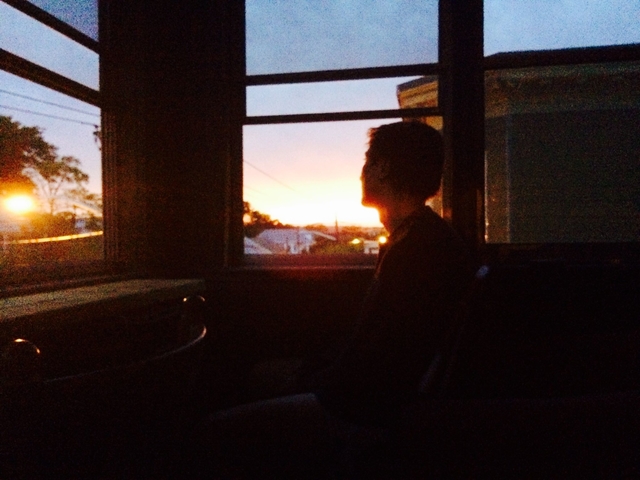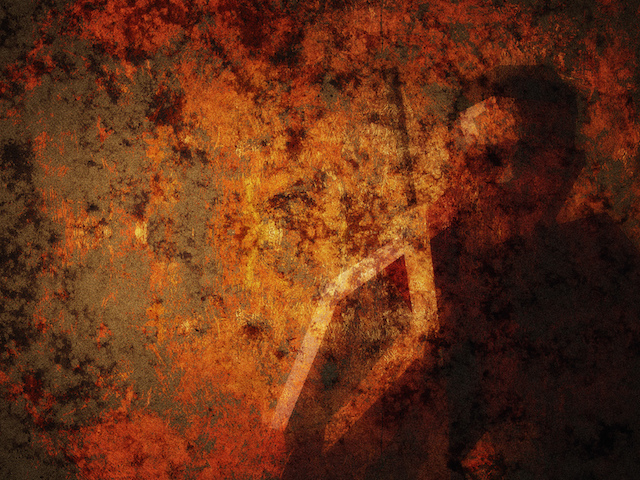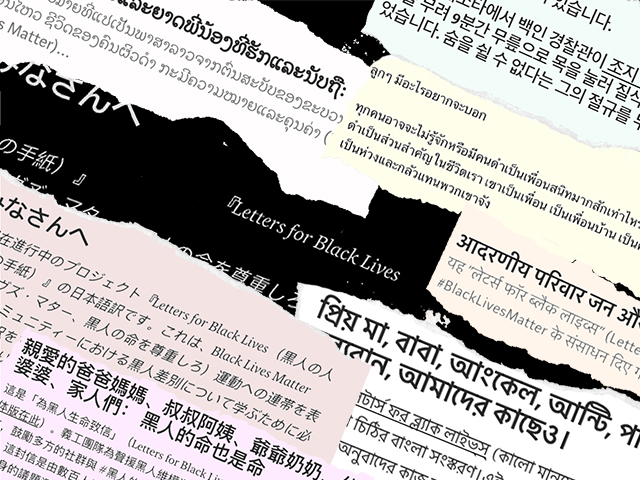What gets lost in translation in the myth of American benevolence during the Korean War

December 20, 2017
The first summer I lived in Vietnam, I spent several weeks in a remote rural village in a central province. Every afternoon as the sun went down, women and children gathered by the communal water pumps to wash. I joined the daily ritual to rinse off the sweat of the day, but mostly to listen to the banter. After a few days, I mustered up the courage to ask about a crater nearby, a cavernous pit of red mud where nothing grew.
“Chi?n tranh M?,” an older woman replied, shrugging off the words. “American War.” It had been a revelation the first time I heard this term in my Vietnamese language class more than 8,000 miles away. But whatever intellectual tingle I felt learning this term in the classroom was nothing compared to what I felt at the edge of that crater.
“American War.” These words knocked me back against the other name I knew, “Vietnam War.” This name framed the conflict as a civil war, and erased the U.S. completely. “American War,” on the other hand, was unequivocal about framing the U.S. as an aggressor, a primary instigator of the conflict. But it also erased the people who had been the most heavily affected by it. Which “American War,” after all? There were so many.
I was left with a conundrum: Whose language should I speak? What names should I use?
This question echoed the one I had about the Korean War, a war in which the U.S. had also played a decisive role. This war also has many names depending on where you stood–South Korea, North Korea, or the U.S., where the most common moniker is brutally frank: the Forgotten War.
The wars in Korea and Vietnam were singularly destructive, with millions of civilian deaths and entire cities and villages wiped off the map. So the lack of fluency about these wars is deeply unsettling. Both of my parents had survived the Korean War, but they hardly spoke of it. The country seemed to have been split in two by natural forces. “Korea was divided in 1945” was the most common phrase I saw in the news and in textbooks.
In Hardly War, Don Mee Choi’s latest book of poetry, she grapples with how to speak about this “faint history” in its own “faint language.” Her entry point is through the images her photojournalist father, living in Korea, captured during both conflicts. Because the Vietnam War called her father away during Choi’s childhood upbringing in Korea, his photographs always served as more than just images; they stood in for her father himself. They are the first site of her childhood reconstructions, a habit that informs her making of the book.
Choi layers the photographs with headlines, posters, political speeches, military emblems, songs, and drawings from this period. This makes Hardly War a distinctly visual document, in which the images merge with text to form fields of marks. This method gestures to the work of Yi Sang, an experimental poet from Korea’s colonial period who used wordplay and abstraction to obliquely critique and insult Japanese rule.
As with Yi Sang’s work, Choi’s poetry resists any straightforward reading. Instead, Choi’s rough language of commands, facts and slogans transforms the familiar into something alien and discordant. Each line dislocates the next—a Christmas carol crackles against napalm—burned skin, a figure “cheerily cheerily” washes her face while fighter planes scream overhead.
If we are unsettled by her poems, then Choi has accomplished her aim. As she writes early in the book, the Korean War disrupted the ethno-nationalist “one nation, one race” identity that Koreans had fostered during the colonial period. Without these fixed categories of statehood and citizenship to rely on, poetic language becomes Choi’s tenuous medium. Rather than try to reify and re-establish those fraught and disrupted boundaries, however, she attempts to tell us how the world has changed.
In the prologue to Hardly War, Don Mee Choi writes that she is trying to write a “geopolitical poetics” that “involves disobeying history, severing its ties to power.” How else can she write, as she does in one of her poems:
Please! I dare you to spray my button eyes,
spray my button nose, spray my adorable snout, spray my furry
ears, and what do you get? My deformity! My double torso is in
a jar.
Behind this text, Choi has layered a poster of Smokey Bear, the iconic mascot created by the U.S. Advertising Council to educate the public about the danger of forest fires (tag line: “Only YOU can prevent forest fires”). However, in her poster, the line becomes much more foreboding: “Only you can prevent a forest.” When the bear dares the planes to spray him and then crows, “My deformity! My double torso is in / a jar,” it names the defects caused by Agent Orange, a defoliant that the U.S. military sprayed to strip Vietnam’s jungle landscape.
But evoking Smokey Bear as a war mascot is not just a flight of Choi’s imagination—Smokey was indeed enlisted as a forest protector during World War II, when so many men were called away to fight that they couldn’t be spared to fight forest fires at home. The act of imagining Smokey Bear as a defiant victim of Agent Orange is a form of disobedience to history that re-links iconic American characters to the cruelties of American warfare.
Choi grapples with the fallout of the Vietnam War in the second part of the book, “Purely Illustrative.” In “Neocolony’s Colony,” (the title making no attempt to hide Choi’s views on why South Korea was fighting in a U.S. war), she faces the brutality committed by the Tiger Division, a regiment in the Korean military responsible for the most infamous civilian massacres of the war in Vietnam. The boys and orphans of Korea’s war have now become men, and the men have become soldiers. How quickly they have forgotten what it’s like to be on the other side of the bayonet:
O dream—no face just a wide-open belly
O fetus in the split womb
O cut off the baby cord
O war—breasts cut out and woman shot by ROK marines
These images stem from the nightmares that Choi has when learning about the South Korean troop massacres. But the poem cheerfully ends, “O bonuses!”
Choi has often said that failure is a “primary technique” for her poetry and translation. By this, she seems to be describing her failure to abide by any convention of poetry—including her refusal to use either Korean or English “properly,” her failure to translate from one language to the other, and ultimately, her failure to rewrite the history of either war. Instead, she plays in the detritus of the propaganda produced to sustain war and allows something strange to happen with the jumbled fragments.
The idea of failure is extended to the central concept of the book itself. What is “hardly war”? Choi fills the book with the words “hardly” and “partly” and “narrowly”—highlighting the gaps between everything we take for granted—nationhood, citizenship, winners and losers—and the way war upends these ideas. In the opening poem “Woe Are You?” Choi writes:
It occurred to me that this particular war was hardly war because of kids, more kids, those poor kids. The kids were hungry until we GIs fed them… In the end it was the hardliest of wars made up of bubble gum, which GIs had to show these kids how to chew.
In this passage and throughout the book, she explores a powerful mythology of the Korean War—that of American benevolence. After all, is a war “made up of bubble gum” so cruel and terrible? The Korean War, by this logic, is “hardly war” because U.S. soldiers gave Korean children the scraps of their army rations.
But it is not just the war that is hardly itself. In the next paragraph, Choi continues: “My father was hardly himself during the war, then I was born during the era that hardly existed, and, therefore, I hardly existed without DDT.” The war engenders “hardly” humans. When Choi refers to DDT, an insecticide sprayed by U.S. soldiers on themselves and the local population during the war, she again makes reference to the violence that American benevolence masks.
We are forced to ask: what does it mean to exist during a war? Is it merely to stay alive at the behest and mercy of a more powerful country? What happens to language when that country doles out both bombs and aid—are we then forbidden from speaking about the bombs?
Choi’s failure as poetic technique also extends to her failure to translate. A key element of Hardly War, as in much of her work, is her wordplay between Korean and English—a practice that widens, not narrows, the gap between the two languages. What she calls “inter-lingual punning” is especially apparent in the way she refers to the United States throughout the book. Instead of naming the country, Choi refers to the U.S. by its transliterated Korean name, “me-gook,” which means beautiful nation.
As she writes in “Race = Nation,” the war brought her into contact with the U.S. soldier’s slur for all Koreans, “gook.” “Gook” trumped Communist or North Korean, the ostensible enemy, because from the racist perspective of many American soldiers, all Koreans looked alike. The irony is that American soldiers, hearing Koreans say “me-gook” in Korean, may have mistakenly thought that Koreans were saying “me=gook,” and thereby chosen “gook” as an easy and obvious slur. Thus, the gap between Korean and English ended up being crucial to creating the war’s new identities and racist epithets.
Choi plays with this confusion, scattering both “Beauty=Nation” and “me=gook” throughout her book. As she writes in “The Hydrangean Candidate,” “Beauty=Nation is the kindest, bravest, warmest, most wonderful nation I’ve ever known in my life.” In another poem, it’s as if she is unable to say the words: “Beauty=4=4=4=4=4=4=4=4=4=4=0=Nation / Beauty=Me=Me=Me=Me=0=Nation/ Me=Over.” Can we continue to call the United States “beautiful nation” after everything that Choi asks us to witness?”
For a bilingual reader, Hardly War is a multi-tonal experience. The sing-song rhythms of Choi’s writing as a child, an unsent postcard from her father, and the musical lyrics, all in Korean, add a layer of static and counter-rhythm to the text. Rather than expect readers to be fluent in Korean, though, Choi clarifies the provenance of the found texts by listing the historical and personal events related to them in the notes at the back of the book. Readers might find themselves going back and forth between the poems and the notes, or might read the poem anew after perusing the notes. Ultimately, her notes function as an archive to remind readers that Choi’s work is partly a labor of excavation, and that the poems are as real an artifact of war as her father’s photographs.
Among the notes, Choi has inserted a crucial fact: “[My father] emphasized many times as he recalled his war experiences that the real victims of war are civilians. Now my father only photographs flowers.” Flowers thus are tied to her father’s desire to move on from the traumatic images of war that he has witnessed, and to replace them with images of flowers, which seem to transcend that world.
In Choi’s poetry, however, flowers emerge as central characters, as a chorus of voices that are inextricably affected by war. Nowhere is this more apparent than in “Hardly Opera,” the third and final section of the book, a libretto based on Choi’s interviews with her father. Here, most of the characters that her father’s camera Elmar speaks to are flowers. Forsythias address azaleas, hydrangeas say “Yes, ma’am,” and a rose of Sharon (South Korea’s national flower) interjects in a conversation between declassified flower and classified flower. It is these flowers—the classified flower, the merely peony, the press agency flower—that suggest even flowers are not spared the logic of war and its naming power.
In the final lines of the libretto, her father, Camera Elmar, begins a soliloquy, “I speak as a flower—/ rose of Sharon.” As the camera looks out at what seems to be a bombed-out Pyongyang or a scorched Vietnamese village, it continues:
GI friends—
You want peace—
we want peace—
I must point out a simple truth—
my eye’s filled with the green ocean—
swaying tender seaweed—
hardly a flower—
hardly anything at all—
conveniently ground to a pulp—
This negotiation, this act of witness, is also an entreaty. The camera continues to point out other “simple truths”: “Hello GIs— / Why must you die— / when you have just begun to live?” By the end, the libretto is never completed—only interrupted. Is her father, or any civilian or soldier for that matter, left alive? That question is left unanswered. This open ending mirrors our present-day condition: the Korean War has never officially ended.
Hardly War is harrowing to read, a full-bodied immersion into a stream of jagged, unharmonized voices. But it also offers comfort in its sly indictment of war’s ideological tools, the language of nationalism, militarism, patriotism, and the binaries of the Cold War. Perhaps the swaying hydrangeas and the declassified flowers of Choi’s cosmos may linger in our minds, propagating more disobedient vocabulary for talking about war and imagining a future beyond its ravages.



